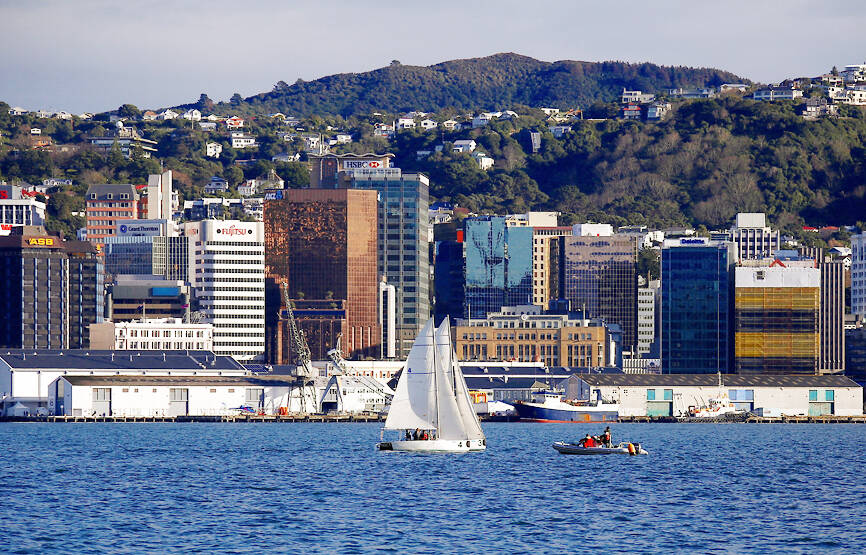The FBI has opened a standalone office in New Zealand’s capital in part to improve the US’ and New Zealand’s ability to counter China’s presence in the Pacific region, FBI Director Kash Patel said yesterday.
Patel has spent the past few days in the capital, Wellington, meeting with senior government ministers, as well as intelligence bosses and law enforcement officials.
He said in a statement that opening a dedicated law enforcement attache office in the capital would strengthen and enhance Washington’s longstanding co-operation with one of its key partners in the southwestern Pacific.

Photo: Reuters
“Some of the most important global issues of our times are the ones that New Zealand and America work on together — countering the CCP [the Communist Party of China] in the INDOPACOM [US Indo-Pacific Command] theater, countering the narcotics trade, working together against cyberintrusions and ransomware operations and most importantly protecting our respective citizenry,” he said in a video released by the US embassy in Wellington.
The FBI has had a suboffice in New Zealand since 2017 and the two countries work closely on policing issues including child exploitation and organized crime.
New Zealand and the US have been working more closely together amid concerns about China’s increasing influence in the Pacific. They are both members of the intelligence-sharing partnership known as the “Five Eyes,” which also includes Australia, Canada and the UK.
“The FBI cannot do it alone,” Patel said. “Our partners in the Five Eyes are our greatest partners around the world, but we need all of them ... to get after the fight and put the mission first.”
New Zealand Minister of Defence Judith Collins and New Zealand Minister of Police Mark Mitchell said in a statement that they welcomed the new FBI office, which they said would enhance the safety and security of New Zealanders.
The office would also cover FBI partnerships in Antarctica, Samoa, Niue, the Cook Islands and Tonga, the US embassy said.

PRECARIOUS RELATIONS: Commentators in Saudi Arabia accuse the UAE of growing too bold, backing forces at odds with Saudi interests in various conflicts A Saudi Arabian media campaign targeting the United Arab Emirates (UAE) has deepened the Gulf’s worst row in years, stoking fears of a damaging fall-out in the financial heart of the Middle East. Fiery accusations of rights abuses and betrayal have circulated for weeks in state-run and social media after a brief conflict in Yemen, where Saudi airstrikes quelled an offensive by UAE-backed separatists. The United Arab Emirates is “investing in chaos and supporting secessionists” from Libya to Yemen and the Horn of Africa, Saudi Arabia’s al-Ekhbariya TV charged in a report this week. Such invective has been unheard of

US President Donald Trump on Saturday warned Canada that if it concludes a trade deal with China, he would impose a 100 percent tariff on all goods coming over the border. Relations between the US and its northern neighbor have been rocky since Trump returned to the White House a year ago, with spats over trade and Canadian Prime Minister Mark Carney decrying a “rupture” in the US-led global order. During a visit to Beijing earlier this month, Carney hailed a “new strategic partnership” with China that resulted in a “preliminary, but landmark trade agreement” to reduce tariffs — but

SCAM CLAMPDOWN: About 130 South Korean scam suspects have been sent home since October last year, and 60 more are still waiting for repatriation Dozens of South Koreans allegedly involved in online scams in Cambodia were yesterday returned to South Korea to face investigations in what was the largest group repatriation of Korean criminal suspects from abroad. The 73 South Korean suspects allegedly scammed fellow Koreans out of 48.6 billion won (US$33 million), South Korea said. Upon arrival in South Korea’s Incheon International Airport aboard a chartered plane, the suspects — 65 men and eight women — were sent to police stations. Local TV footage showed the suspects, in handcuffs and wearing masks, being escorted by police officers and boarding buses. They were among about 260 South

Chinese President Xi Jinping’s (習近平) purge of his most senior general is driven by his effort to both secure “total control” of his military and root out corruption, US Ambassador to China David Perdue said told Bloomberg Television yesterday. The probe into Zhang Youxia (張又俠), Xi’s second-in-command, announced over the weekend, is a “major development,” Perdue said, citing the family connections the vice chair of China’s apex military commission has with Xi. Chinese authorities said Zhang was being investigated for suspected serious discipline and law violations, without disclosing further details. “I take him at his word that there’s a corruption effort under